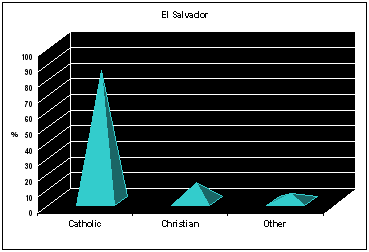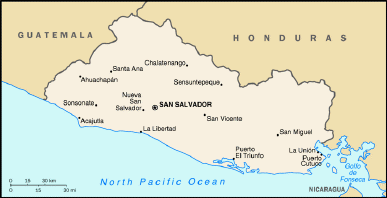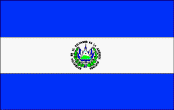|
El
Salvador Introduction
El
Salvador, a population of 5.5 million, is composed
of three ethnic groups: Mestizo (a mixture of European
and Indian)89 percent, Amerindian 10 percent, and
European 1 percent. During the 1980s, the United
States poured $4 Billion into El Salvador in an
effort to support the government and stop the Communist
guerrillas. Not only did the rebels survive, but
the gap between rich and poor widened.
The
official language is Spanish, although many Indians
speak Nahua and other native languages. English
is understood in tourist centers and by much of
the well-educated people. El Salvador has no official
religion. Although the Salvadorans have traditionally
been Roman Catholic, various Protestant sects have
gained ground in recent years and now constitute
about 10 percent of the population.
|
|
El
Salvador Fun Fact
Many
business people are now members of religious Neopentecostal
groups, which equate wealth with God’s favor
(hence the poor are being punished by God for their
lack of faith).
|
|
|
Geert
Hofstede Analysis for
El Salvador
|
|
|
The Geert Hofstede analysis for El Salvador is
similar to it’s
Latin American neighbors. Uncertainty avoidance ranks highest which
indicates a high concern for rules, regulations, controls and issues
with career security – typically, a society that does not
readily accept change and is risk adverse. Individualism ranks
lowest which signifies a society of a more collectivist nature
and strong relationships where everyone takes responsibility
for fellow members of their group.
El
Salvador is similar to many Latin
American countries when analyzing Hofstede's Dimensions (see
Latin America Hofstede Graph below).
El
Salvador's highest Hofstede Dimension is Uncertainty
Avoidance (UAI) at 94, indicating the society’s
low level of tolerance for uncertainty. In an effort
to minimize or reduce this level of uncertainty,
strict rules, laws, policies, and regulations are
adopted and implemented. The ultimate goal of this
population is to control everything in order to eliminate
or avoid the unexpected. As a result of this high
Uncertainty Avoidance characteristic, the society
does not readily accept change and is very risk adverse.
El
Salvador has a low Individualism (IDV) rank of
19, as do most Latin countries. The score on this Dimension
indicates the society is Collectivist as compared
to Individualist. This is manifest in a close long-term
commitment to the member 'group', be that a family,
extended family, or extended relationships. Loyalty
in a collectivist culture is paramount, and over-rides
most other societal rules and regulations. The
society
fosters strong relationships where everyone takes
responsibility for fellow members of their group
In
many of the Latin American countries, including El
Salvador, the population is predominantly Catholic
(see Religions Graph below). The combination of Catholicism
and the cultural dimensions, shown in the Hofstede
Graphs above, reinforce a philosophy predicated in
the belief that there is an absolute ‘Truth”.
As Geert Hofstede explains about peoples with a high
Uncertainty Avoidance Index, their attitude is, “There
can only be one Truth and we have it.” More Geert Hofstede Details
Written
by Stephen Taylor - the Sigma
Two Group
|
Religion
in El Salvador

*
WORLD FACTBOOK 2011
In a country that has over 50% of its population
practicing the Catholic religion, we found the primary
correlating Hofstede Dimension to be Uncertainty
Avoidance (UAI). There were only 2 countries out
of 23 that did not follow this correlation, they
were Ireland and the Philippines. (See accompanying
Article)
|
El
Salvador Appearance
 For
business, men should wear a conservative, lightweight
suit. Women should wear a blouse and skirt or dress For
business, men should wear a conservative, lightweight
suit. Women should wear a blouse and skirt or dress
 Do
not point your fingers at anyone Do
not point your fingers at anyone
 Good
eye contact is important in business situations Good
eye contact is important in business situations
 Salvadorans
are expressive with both hands and face; this complements
their verbal communication Salvadorans
are expressive with both hands and face; this complements
their verbal communication
 To
beckon someone over, extend the arm and wriggle
the fingers with the palm down. Only summon close
friends with this gesture To
beckon someone over, extend the arm and wriggle
the fingers with the palm down. Only summon close
friends with this gesture
 Yawning
in public is considered rude and should be avoided Yawning
in public is considered rude and should be avoided
|
| |
El
Salvador Behavior & Manners
 Make
appointments a month in advance of your trip by
telephone or by telex Make
appointments a month in advance of your trip by
telephone or by telex
 Business
is done only after a relationship has been established.
Spend time forming a friendship before jumping
into business discussions Business
is done only after a relationship has been established.
Spend time forming a friendship before jumping
into business discussions
 It
is rare to find women in upper levels of business.
A visiting business woman should act professionally
and convey that she is representing her company,
rather than speaking for herself personally It
is rare to find women in upper levels of business.
A visiting business woman should act professionally
and convey that she is representing her company,
rather than speaking for herself personally
 Business
is discussed in an office or over a meal. It is
not discussed in the home or around family. If
you are invited to a Salvadoran home, this is purely
a social function Business
is discussed in an office or over a meal. It is
not discussed in the home or around family. If
you are invited to a Salvadoran home, this is purely
a social function
 The
main meal of the day is at noon. This will probably
include black beans, tortillas or meat, and fruit
and vegetables The
main meal of the day is at noon. This will probably
include black beans, tortillas or meat, and fruit
and vegetables
 Small
gifts often exchanged. If you are invited to a
Salvadoran home, it is appropriate to bring a gift
of candy or flowers Small
gifts often exchanged. If you are invited to a
Salvadoran home, it is appropriate to bring a gift
of candy or flowers
 Avoid
giving white flowers; they are associated with
funerals Avoid
giving white flowers; they are associated with
funerals
 More
information on International Gift Giving More
information on International Gift Giving
 Considering
sending a gift to someone in El Salvador? See
this information Considering
sending a gift to someone in El Salvador? See
this information
|
| |
El
Salvador Communications
 Handshaking
is the usual form of greeting; it is typically
limp and normally lasts longer than a U.S. handshake Handshaking
is the usual form of greeting; it is typically
limp and normally lasts longer than a U.S. handshake
 Some
people merely nod when meeting Some
people merely nod when meeting
 While
Salvadoran men are willing to shake hands with
women, the women must first extend her hand. Foreign
men should wait for a Salvadoran woman to extend
her hand While
Salvadoran men are willing to shake hands with
women, the women must first extend her hand. Foreign
men should wait for a Salvadoran woman to extend
her hand
 Keep
the vocal component of your greeting soft. Many
Salvadorans dislike loud persons Keep
the vocal component of your greeting soft. Many
Salvadorans dislike loud persons
 Titles,
especially among the elderly, are very important.
Address a person directly by using his or her title
only. A Ph.D or a physician is called Doctor.
Teachers prefer the title Profesor, engineers
go by Ingeniero, architects are Arquitecto,
and lawyers are Abogado. Persons who do
not have professional titles should be addressed
as Mr., Mrs., or Miss, plus their surnames. In
Spanish these are: Titles,
especially among the elderly, are very important.
Address a person directly by using his or her title
only. A Ph.D or a physician is called Doctor.
Teachers prefer the title Profesor, engineers
go by Ingeniero, architects are Arquitecto,
and lawyers are Abogado. Persons who do
not have professional titles should be addressed
as Mr., Mrs., or Miss, plus their surnames. In
Spanish these are:
- Mr.
= Senor
- Mrs.
= Senora
- Miss
= Senorita
 Most
Hispanics have two surnames: one from their father,
which is listed first, followed by one from their
mother. Only the father’s surname is used
when addressing someone Most
Hispanics have two surnames: one from their father,
which is listed first, followed by one from their
mother. Only the father’s surname is used
when addressing someone
 Good
conversation topics: history, geography, culture,
families Good
conversation topics: history, geography, culture,
families
 Bad
conversation topics: local politics, religion Bad
conversation topics: local politics, religion
|
| |
|
|
|
|
|
HOME
PAGE
|
|
|
|
|
Resources
Geert Hofstede Free
Monthly Newsletter Resource
Page
International
Business Center
|
|
|
|
|
|

Thanks
to the UTD Global MBA graduates who work
diligently on collecting the information for this Website
|
Page authored by: Joni Nicol
|
|
|
|
|
|



